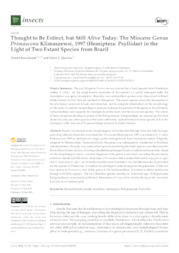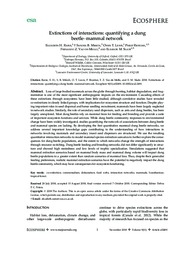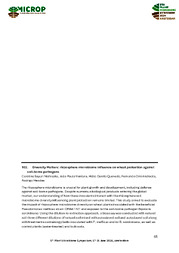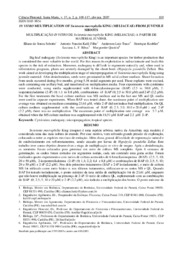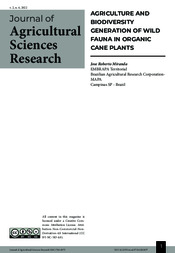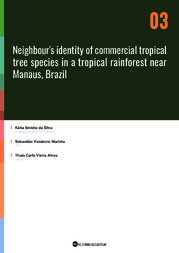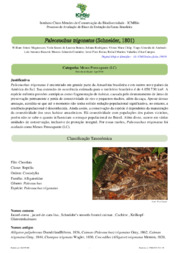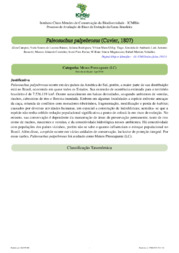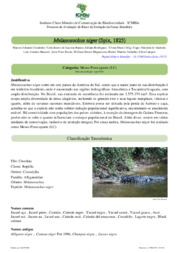Search Publications
Filter by:
| Author(s): BURCKHARDT, D.; QUEIROZ, D. L. de Fossils can document the morphological diversification through time and date lineages, providing relevant characters are preserved. Primascena Klimaszewsi, 1997 was erected for P. subita Klimaszewsi,... ... |
| Author(s): FRITZSONS, E.; SOUZA, S. F. de; WREGE, M. S.; AGUIAR, A. V. de; LOPES, M. T. G.; SOUSA, V. A. de A extração ilegal de espécies de interesse madeireiro na Amazônia é uma realidade que exige atenção e monitoramento, a fim de evitar a extinção e perda da diversidade genética de populações naturais.... ... |
| Author(s): RAINE, E. H.; MIKICH, S. B.; LEWIS, O. T.; RIORDAN, P.; VAZ-DE-MELLO, F. Z.; SLADE, E. M. Loss of large-bodied mammals across the globe through hunting, habitat degradation, and fragmentation is one of the most significant anthropogenic impacts on the environment. Cascading effects of thes... ... |
| Diversity matters: rhizosphere microbiome influence on wheat protection against soil-borne pathogens Author(s): NISHISAKA, C. S.; VENTURA, J. P.; QUEVEDO, H. D.; ANDREOTE, F. D.; MENDES, R. The rhizosphere microbiome is crucial for plant growth and development, including defense against soil-borne pathogens. Despitenumerous biological products entering the global market, our understandin... ... |
| Author(s): SCHOTTZ, E. de S.; KALIL FILHO, A. N.; TRACZ, A. L.; KOEHLER, H.; RIBAS, L. L. F.; QUOIRIN, M. Big-leaf mahogany (Swietenia macrophylla King) is an important species for timber production that is considered the most valuable in the world. For this reason its exploitation is indiscriminate and l... ... |
| |
| Author(s): SILVA, K. E. da; MARTINS, S. V.; ALVES, T. C. V. The use of spatially explicit neighbourhood approach helps to understand the processes which structure and guide tree communities over space and time, contributing for the conservation and forest mana... ... |
| Author(s): MAGNUSSON, W. E.; BATAUS, Y. S. L.; RODRIGUES, J.; UHLIG, V. M.; ANDRADE, T. A.; BASSETTI, L. A.; COUTINHO, M. E.; FARIAS, I. P.; VALADÃO, R. M.; CAMPOS, Z. Paleosuchus trigonatus é encontrado em grande parte da Amazônia brasileira e em outros nove países da América do Sul. Sua extensão de ocorrência estimada para o território brasileiro é de 4.058.730 km... ... |
| Author(s): CAMPOS, Z.; BATAUS, Y. S. L.; RODRIGUES, J.; UHLIG, V. M.; ANDRADE, T. A.; BASSETTI, L. A.; COUTINHO, M. E.; FARIAS, I. P.; MAGNUSSON, W. E.; VALADÃO, R. M. Paleosuchus palpebrosus ocorre em dez países da América do Sul, porém, a maior parte de sua distribuição está no Brasil, ocorrendo em quase todos os Estados. Sua extensão de ocorrência estimada para o... ... |
| Author(s): COUTINHO, M. E.; BATAUS, Y. S. L.; RODRIGUES, J.; UHLIG, V. M.; ANDRADE, T. A.; BASSETTI, L. A.; FARIAS, I. P.; MAGNUSSON, W. E.; VALADÃO, R. M.; CAMPOS, Z. Melanosuchus niger corre em sete países da América do Sul, sendo que a maior parte de sua distribuição é em território brasileiro, onde é encontrado nas regiões hidrográficas Amazônica e Tocantins/Ara... ... |
Observation
Some of Embrapa's publications are published as ePub files. To read them, use or download one of the following free software options to your computer or mobile device. Android: Google Play Books; IOS: iBooks; Windows and Linux: Calibre.
Access other publications
Access the Agricultural Research Database (BDPA) to consult Embrapa's full library collection and records.
Visit Embrapa Bookstore to purchase books and other publications sold by Embrapa.

